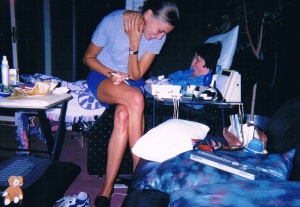Early this morning I drove with my kids, gazing out my window at the soft green fields flanking us and then up at the sky, knitted thick with white clouds. As we crested a hill, I saw the sky brighten as the sun pulsed through.
“Look,” I said to them, “it’s turning into a sunny day.”
My daughter peered out her window. “Yeah, it started out all cloudy like last week and now the sun’s coming out.”
I nodded. “Greedles (our word for my dad) used to say the sun is burning off the clouds. It happens a lot at the beach.”
Then, just like that, I was on the beach behind my father’s house, the one he sold last summer. I felt an ache so deep, and unexpected, it almost knocked me over like a wave.
Last summer, around the same time we sold our Brooklyn apartment, my father sold his house. I mourned both losses, feeling them acutely, as I tend to do with any kind of change, big or small. The beach house wasn’t my childhood home, but it was the place where my mother died and partly where Emma grew up.
The summer after she turned one, we moved in with my dad for nine months while we decided on the fate of our Brooklyn geography.
It was a hard gestation, despite the absolutely stunning backyard beach access and three floors to explore. Emma was a challenging baby, nursed around the clock, and slept terribly. My husband, who was having health issues, slept in the basement level with the cats while I night parented her on my own.
In some respects, I’ve never felt lonelier. But I had the beach to turn to, and the tide soothed me, as did the sunrises I witnessed almost every morning when my daughter woke in the dark.
Despite the long lonely winter, I felt grateful to be living with my dad in his big beautiful house, decorated on every level with my mom’s pottery, and on every level a gorgeous view of the beach. We filled up his house with toys, laughter, and tears, until we returned to Brooklyn the following February.
When he sold it last summer, I boxed up my sadness and sealed it shut. I didn’t have much room for beach nostalgia since I was overwhelmed by our upcoming life-altering shift from city to country.
I did quietly weep when I walked through the house for the last time. My husband found me on my knees in my father’s room in the spot where my mother had died on her hospital bed. That sacred spot where I witnessed the depth of her strength, and felt glimmers of my own.
After she died, I couldn’t walk through that room without dissolving into tears, but as the years passed the intensity lessened. I had one child, and then another, both who loved to run into my father’s bedroom after their baths. They rolled around on his thick white duvet, giggling and squealing as I diapered them up and slid on pajamas.
Molecules of sadness shifted to make room for joy.
I still visited the spot. Sometimes during a hectic moment, I’d go and just sit right where her bed had been. Where we once held a vigil for her death had become a place of peace for me, but now it’s only a memory, tangled up with so many more.
As I witnessed the sun burning off the clouds on our drive this morning, I longed to be on my father’s beach. My absolute favorite times of day was during transition – dawn or dusk, but I preferred early morning, when the wide expanse of sand was filled with only a handful of seagulls and nothing else.
We’d come down early, sometimes with our coffee mugs in hand, forgoing sunscreen for the kids, just grabbing a bucket or two for shell collection. I loved foraging through the piles of smooth wet rocks on the shore, picking out shards of shell that made me think of sunsets, faded purple and gray smudges on pearly white.
When the sun had risen higher, and one or both of the kids started to whine about being hungry or needing to pee, we’d trudge upstairs as the first beach goers would be coming down. The best time of the day had been ours to savor.
I will miss those mornings, and also the memories of mornings before my children were born, the summer after my mom died. My father and I each had our preferred “rocks,” big gray slabs that made up the old jetty that is now buried in sand.
His looked like a chair with a straight back. Just like a shiva chair, I realize now, and that’s what he used it as. He sat shiva for my mother there, mourning her loss and the end of their life together. My rock was higher up, flat and smooth, where I stretched out with my sadness and journal.
That house belongs to another family now, and that particular beach is no longer ours to enjoy, but I’m so grateful for my memories. The sweet and the bitter, all swirled together like the soft serve we loved to get at the day’s end.
As we continued on our drive, my eyes damp, my daughter asked me to remind her of Grandma Susan’s favorite flower. I was so taken aback by her question I could barely get out the words.
“She loved orange tiger lilies,” I finally answered.
“I knew that,” my daughter said, and I could hear the smile of pleasure in her voice.
Then off I went, the thread of memory unraveling further, back to my childhood home where I am fairly certain the tiger lilies she planted still bloom.
Memories live on in our bodies and minds, and often it only takes a phrase, a lightening of the sky, an innocent question to unravel the whole messy ball, or open an abandoned box.










